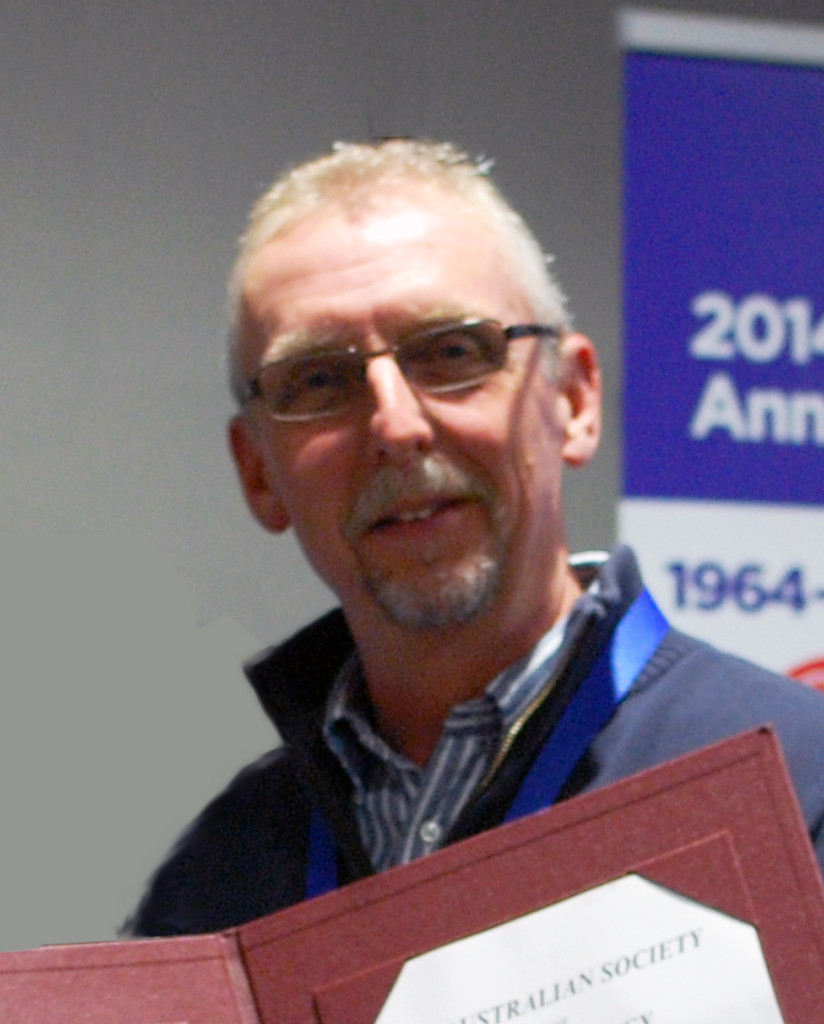
Citation
Robert Adlard received a BSc (Honours) from the University of Queensland in 1983 and a PhD from the same university with a thesis entitled, “The effects of the parasitic isopod Anilocra pomacentri Bruce (Cymothoidae) on the population dynamics of the reef fish Chromis nitida Whitley (Pomacentridae)”. He then held positions as Postdoctoral Fellow in the Department of Parasitology, University of Queensland, and Assistant Curator of the Queensland Museum. Rob has also served as consultant to industry in marine sciences, specializing in the control of parasitic infections of commercial species. Rob has carved out a role as an international leader in the field of parasite biodiversity. Rob was the inaugural curator of the globally significant International Research Centre for Avian Haematozoa (IRCAH).
Rob is now Head of Marine Environments (while retaining the title of Senior Curator of Parasitology) at the Queensland Museum, and has responsibility for the significant collections of parasitological specimens at the Museum, estimated as around the fifth-largest collection of such material anywhere in the world and representing a major resource for the members of the Australian Society for Parasitology.
Rob’s career has focused almost exclusively on understanding the biology and diversity of parasites of marine organisms and wildlife. His work has had a strong whole organism and ecological focus, with a view to solving major economic problems of significance to Australian and international fisheries. Among his research achievements are: the first empirical demonstration undertaken in an open marine system (Great Barrier Reef), proving that parasites regulate host fish populations; demonstration that polychaetes are involved in the lifecycle of QX disease (Marteilia sydneyi), a significant pathogen of commercial oysters; determination of the oyster cycle of this parasite using molecular probes, epidemiology and causal webs for the disease agent and devising a scientific evidence-based management plan; demonstration that the wide host range and wide geographic distribution of marine White Spot Disease (Cryptocaryon irritans, a devastating pathogen of aquarium fish and fish in aquaculture), was the result of the presence of a species complex; determining the life cycle of a significant pathogen of Southern Bluefin Tuna – provided enabling information for management by industry; rationalised the systematics of myxozoan parasites and assessed biological correlates to provide a benchmark for study and diagnosis of these fish pathogens. Rob has discovered and described a total of 140 new species of parasites from fish and wildlife, providing substantial enhancement of knowledge of the diversity of parasites in Australia.
Rob has been an outstanding mentor in parasitology. He has supervised 14 PhD and 10 Honours students to successful completion of their studies. He has funded and mentored 4 post-doctoral fellows. Dr Adlard has been an excellent advocate for the discipline of Parasitology in television and radio interviews on issues in parasitology, in television shows for children, public lectures, Museum National Science Week activities, parasite exhibitions and Meet-the-Curator programs at the Queensland Museum. He has strong input into the ASP’s Parasites in Focus exhibition. In keeping with his broad interests in biology, Rob has contributed chapters and images to local popular publications, including Wildlife of Greater Brisbane, Wild Guide to Moreton Bay, Discovery Guide to the Great Barrier Reef, and led the development of a Field Guide to Queensland Fauna smart phone app launched in May 2014.
An international advocate for Australian parasitology, Dr Adlard is currently a member of the Steering Committee for the MalariaRCN, a research co-ordination network funded by the National Science Foundation (USA) to promote research on Malaria and Related Haemosporidian Parasites of Wildlife. He has published 100 peer-reviewed scientific research papers and is recognised as a world expert in myxozoan parasites of fishes, presenting an invited Keynote Lecture on the subject at the International Symposium of Fish Parasites in 2011 in Chile. He has presented almost 100 conference papers on his work both nationally and internationally and won over $3.4 million in competitive grant funding. He is a currently a Regional Resource Expert for the Network of Aquaculture Centres of the Asia-Pacific (centred in Bangkok) and Chair of the National Reference Group for the Neptune project, the Australian aquatic animal health web-platform.
Rob has been one of the most loyal and hardworking servants of the Australian Society for Parasitology. He has been executive secretary of the ASP Council on two occasions, and Queensland State representative for three years. He has served on the organizing committee of 1999 Conference in Yeppoon and the 2006 conference on the Gold Coast. He is now a member of the curriculum committee for the ASP Kioloa Intensive Parasitology Course to be run for the first time in late 2014. Dr Adlard was a participant and steering committee member of the ARC/NHMRC Research Network for Parasitology bid in 2004, and a member of the Managerial and Advisory committee for the Network from 2007 to 2009. He has served on the Specialist Editorial Board of the International Journal for Parasitology for two terms. Through his endeavours, Rob has promoted the advance of parasitology and has rendered conspicuous service to the cause of Parasitology and the Society. Dr Robert Adlard is a very worthy recipient of the Fellowship of the Australian Society for Parasitology.


